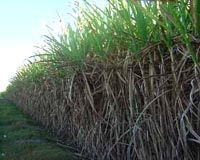 |
Washington DC (SPX) May 15, 2009 The Brazilian Sugarcane Industry Association (UNICA) has welcomed the White House's announcement that the Environmental Protection Agency (EPA) will finally publish proposed rules to implement the Renewable Fuel Standard (RFS). UNICA confirmed that it would submit formal, detailed comments to the EPA in coming weeks. UNICA President and CEO Marcos Jank said from Brazil that his organization is pleased with the decision of the Obama Administration, after months of deliberation, to let the EPA publish its draft rules to implement the 36 billion gallon biofuel standard. "Sugarcane ethanol has a verifiable reduction in greenhouse gases of 90% compared to gasoline, which makes it an 'Advanced Biofuel' under RFS guidelines," adds Jank. Last week, the White House completed its review of the EPA proposed rules to implement the new RFS and allowed publication of the draft regulations for public comment during a 60-day period. The RFS was originally created by the U.S. Congress in 2005 but was expanded in December of 2007. The new RFS, which the proposed EPA rules would implement, requires not only greater volumes of renewable fuels (36 billion gallons by 2022) but also that renewable fuels meet a minimum level of reduction in greenhouse gas emissions, ranging from 20% to 60%. However, apparently without the knowledge of many members of Congress, the 2007 legislation determined that new RFS regulations must include so-called market-mediated effects of expanded biofuels production. "As evidenced by the recent debate over the Low Carbon Fuel Standard in California, biofuels are greatly penalized by these preliminary calculations," said UNICA Chief Representative in Washington Joel Velasco, who was in Sacramento for the final vote by the California Air Resources Board (CARB). "We know sugarcane ethanol has the lowest carbon emissions of any liquid biofuel produced today. California recognized as much in its Low Carbon Fuel Standard. We are certain that when the EPA considers the best available data and research, these indirect land use effects from sugarcane cultivation in Brazil will be marginal at best," Velasco concluded. In the Notice of Proposed Rule released on the EPA's website, the agency committed to conduct peer-reviews of key components of its analysis. In addition, the EPA stated that, based on initial analysis of recent research, even including indirect land use effects, sugarcane ethanol produced in Brazil would produce a 64% lifecycle GHG emissions reduction compared to gasoline. In comments submitted to CARB, the Brazilian Sugarcane Industry Association pointed out that cane ethanol's carbon intensity is even lower than initially calculated by the state regulator. Though sugarcane ethanol was found to be the lowest carbon intensity liquid fuel currently evaluated, UNICA argued in a 25-page letter to CARB that any realistic evaluation of carbon emissions from sugarcane biofuels in Brazil must reflect the strict policies being implemented and action already taken to increase mechanical harvesting, phase out sugarcane straw burning and expand cogeneration output. UNICA continues to work with California and federal regulators to improve the accuracy of calculations. The Low Carbon Fuel Standard will reduce by 10% the carbon intensity of all transportation fuels in California by 2020. As a candidate, President Obama supported the adoption of a federal Low Carbon Fuel Standard. Share This Article With Planet Earth
Related Links Brazilian Sugarcane Industry Association (UNICA) Bio Fuel Technology and Application News
 Sugarcane Ethanol Passes Critical Test
Sugarcane Ethanol Passes Critical TestSacramento CA (SPX) May 01, 2009 Sugarcane ethanol has passed a critical test as the California Air Resources Board (CARB) approved its long-awaited, first-of-its-kind Low Carbon Fuel Standard (LCFS). While the Brazilian Sugarcane Industry Association (UNICA) continues to provide evidence that sugarcane ethanol's carbon intensity is even lower than initially calculated by CARB, the decision means sugarcane ethanol will be ... read more |
|
| The content herein, unless otherwise known to be public domain, are Copyright 1995-2009 - SpaceDaily. AFP and UPI Wire Stories are copyright Agence France-Presse and United Press International. ESA Portal Reports are copyright European Space Agency. All NASA sourced material is public domain. Additional copyrights may apply in whole or part to other bona fide parties. Advertising does not imply endorsement,agreement or approval of any opinions, statements or information provided by SpaceDaily on any Web page published or hosted by SpaceDaily. Privacy Statement |